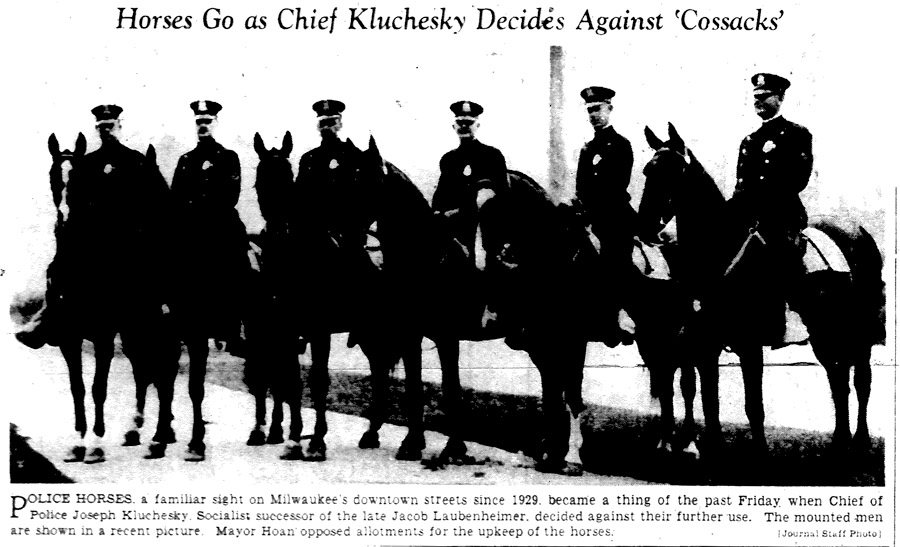Although police horses have been put back into service since 1996, there was a long period of time when they were removed from service. That happened in 1936 as this Milwaukee Journal article tells. The horse patrols actually managed to survive another 12 years after a referendum allowed them to stay. See the Milwaukee Police Mounted Patrol website for more pictures, including a better one of the picture shown in the newspaper below.
Milwaukee Journal, September 18, 1936Attachments built up between Milwaukee’s mounted police officers and their mounts — Tom, Buster, Jerry, Lucky, Buddy and Jerry — were broken Friday by the sudden order discontinuing mounted police.
The hordes went back to their stables at 1226 N. Fourth st. and the officers, Warren Fidlin, William Huebner, George Williams, Domonic Ozzello, Elmer Fischer, Joseph Botton and Clement Stapleford, went back to traffic duty on foot.
The change was so sudden that the officers couldn’t say a word. They wouldn’t have said anything anyway, under the rules of discipline. But the order brought pangs in parting with their dumb friends.
Public Loses Friends
To hundreds of persons who pass through the busy downtown district the absence of the police horses will mean the loss of friends. Folks used to stop to pat the horses and feed them a lump of sugar or a carrot.
What other kind of work the horses could do is a problem, for they are more at home among clanking street cars, rumbling trucks, busy automobile traffic and hurrying crowds than in a field of green grass.
The intelligence and devotion of the horses have been a source of never ending wonder to downtown crowds. When an officer dismounted to make an arrest or do some other bit of routine police work the horse would stand quietly at the curb. In the years they have been on the streets only one black mark has been written against the six.
One horse bit a boy, according to a complaint now before the courts.
Bud, 14, oldest horse of the six, once gave an example of devotion to duty. Williams, the rider, was riding west on Wisconsin av. at noon and the horse was headed for his noonday oats. At the Plankinton building there was a cry about a pickpocket and Williams hurried into the building. He came back to the curb half an hour later, expecting that the horse had followed tht routine lunch time trip, but there stood Bud, patiently waiting.
Buster, Huebner’s mount, is a strictly “one-man” horse. He was slow to make friends and stood indifferent as persons stopped to pat him. When an old friend would approach from Commission Row with a tasty carrot or bite of apple his ears quickly stood up in recognition. Buster had a sweet tooth, too. There was a candy factory on bis beat and when he got hungry he would saunter in that direction as a hint to Huebner.
One a PranksterTom, an 11-year-old, was the mischievous fellow of the lot. Once he reached over and took a parcel in his mouth from a woman shopper. He lifted his head out of reach and seemed to enjoy teasing the woman. When Fidlin scolded him he gave the package back with hasty meekness.
Jerry was the beggar. If a person approached he would scent a lump of sugar or piece of candy and gently nudge the prospective giver. He frequently lifted his front foot as if to shake hands.



